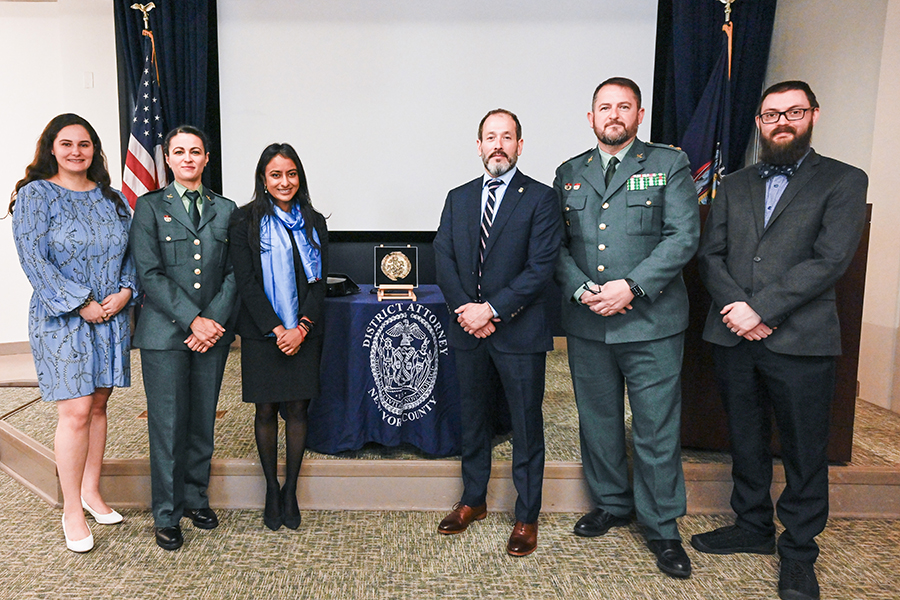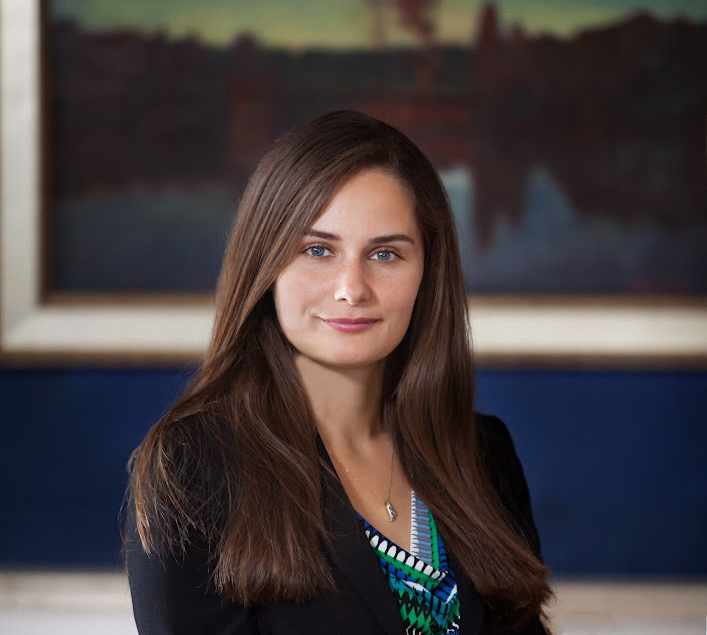Jacqueline Studley, CCJS/Women’s Studies ’14
From the job title alone, it’s clear that Jacqueline Studley, CCJS/Women’s Studies ’14, is interested in the law and in justice—she is an Assistant District Attorney working in the General Counsel’s Office of the New York County District Attorney’s Office. But also central to her studies and to her career has been a passion for art, social sciences, and the humanities. These interests have served her well, as Studley also works in the office’s Antiquities Trafficking Unit.
“My interest in law and in the arts really developed separately, and I just got very lucky to end up in a place where I can pursue them both. I knew I wanted to be a lawyer, and a prosecutor. But art was always a part of my life,” Studley said. She has art from her father’s gallery hanging in her home and, at one point, Studley worked for her mother’s photography business.
During her time at Maryland, Studley enjoyed studying art history in Rome, and also counts courses in criminalistics, anthropology, and women’s studies among her favorites.
Studley started her career as a prosecutor in the Trial Division taking on cases in the more “traditional” sense, and now works in the General Counsel’s Office, handling a range of legal work from fugitive matters to civil litigation. Studley also lends her experience to the Antiquities Trafficking Unit.
“I work on cases from multiple angles, and have a different role as a prosecutor than I think most people would imagine,” Studley said. “New York City is a crossroads of the world, and we handle things that are unique from other cities.”
Studley explains that, while she had long been aware that humans will traffick anything valuable, she did not realize the scale on which trafficking happens until she began this phase of her career.
“A lot of antiquities trafficking happened decades ago, and it wasn’t policed or controlled effectively. Organizations and individuals did not always self-police the acquisition of items the way they should. More recently, law enforcement’s involvement in antiquities cases has helped precipitate a change in these practices,” Studley said.
When many people read or hear about “antiquities trafficking,” films and television shows might come to mind; they may think of art theft that occurred on a large scale during the Holocaust, or of Indiana Jones intoning that a priceless artifact “belongs in a museum.” Movies, television shows, and even documentaries touching on the theft and trafficking of artifacts usually set up the dynamic of a “good guy” and a “bad guy.” But Studley would remind the public that it’s not always that simple—and that it’s the law that dictates what artifacts belong where, and to whom.
“I don't think people realize how prolific looting is all over the world, and especially in countries during wartime, which can make tracing the facts more difficult. I’ve worked on cases where objects were looted and illegally trafficked during times of unrest, like during civil war in Cambodia or WWII Europe,” Studley said.
“Patrimony laws, which are generally what govern an item’s legality, differ by country. Sometimes there is, but there’s not always a clear-cut theft report for a stolen item,” Studley said. “Often, locals are involved at the beginning of the trafficking path.”
She said that items that are sourced legally should have clean provenance—a chronology of the history of the piece, essentially. There are times when buyers don’t know the true history of a purchased piece or the pertinent laws, and part of the work is investigating the provenance and applicable patrimony laws.
One case that stands out as a proud moment in Studley’s mind sounds almost as if it is out of a movie: it involves Spanish treasure.

“Fairly recently, I attended a repatriation ceremony with Spain. A local with a metal detector looted a medallion from a site in the Extremadura region of Spain. It was smuggled out of the country and made its way to auction in New York. Representatives from the Guardia Seville, the Spanish Consulate, and Homeland Security attended the repatriation ceremony. It was a meaningful example of how you can work with people across countries and roles to return a piece to where it belongs. It’s an object that tells a story about somebody’s history—and it belongs to Spain.”
Studley’s background in criminology and criminal justice certainly helped her build a career in law and enhanced her pursuit of a juris doctor degree at the American University Washington College of Law, but she advises a broad, holistic approach to one’s studies and career.
Studley encourages current UMD students to follow their interests by taking advantage of elective classes, study abroad opportunities, and extracurricular activities, in addition to pursuing their main academic path.
“Criminology incorporates psychology, and that helped me not only to prepare for law school, but also helped to shape how I think about my job and the issues I deal with,” Studley said. “The class I took with Thomas Mauriello in his forensics lab, the study abroad opportunities I pursued in Rome and in Ireland, my women’s studies courses, and classes outside of my major, like anthropology, were not only interesting, but they helped me grow and build a network.”
Networking is very personal and important to Studley, who credits Professor Jean McGloin in the Department of Criminology and Criminal Justice—who led Studley’s study abroad experience in Ireland—with helping confirm her future career path.
“I had conversations with Dr. McGloin when I was thinking about law school versus a doctorate degree in criminology versus other options. Having a faculty member to talk to and connect with helped me figure out what would be a good fit for me. I still send her email updates about what I’m up to—those relationships are really valuable,” Studley said.
When reflecting on her time at Maryland, her time in law school, and her fascinating career, Studley said it’s been exciting to let the journey unfold.
“There is no one path to anywhere. I'm an example of thinking that I was going to have a straight, linear path as a traditional attorney. And now I’m doing work that I had no idea that I would be doing,” Studley said. “We live in a world where we're pushing people, younger and younger, to make really big decisions that you don't necessarily have to make right now. It’s about being intellectually curious, fostering your communication skills, and being dedicated to whatever you choose to pursue.”
Photos provided by Jacqueline Studley.

Published - July 24, 2025



